For the first time at a UN Climate Conference, the burning of fossil fuels was officially acknowledged as the key cause and driver of climate change. Will this signify a new era of climate action?
At the end of 2023, representatives from 200 countries met in Dubai, UAE for COP28, the United Nations’ annual climate summit. While the purpose of this gathering is to push for more ambitious climate action, many were concerned about COP being hosted by a country that continues to advance the fossil fuel economy. This fear was compounded when another petrostate, Azerbaijan, was chosen to host next year’s COP29. As the end of the conference neared, getting any agreement on a final text, let alone ambitious commitments, appeared unlikely. Yet, on Wednesday, December 13th we received news that a “historic” agreement had been reached with the issue of fossil fuels firmly at the center for the first time, thanks to the hard work of many committed climate activists, scientists, and more.
Ultimately, there is much to be celebrated in the “global stocktake” that was reached, (known as the “UAE Consensus”), but also much to be desired. Regardless, good and meaningful work took place throughout the conference, long before the UAE Consensus was finalized. A Rocha was part of the first-ever Faith Pavilion in UNFCCC COP’s history, where faith-based organizations engaged with each other and country delegates to “catalyze more ambitious, effective, holistic and just climate action.” Renew Our World and A Rocha International’s Head of Theology, Dave Bookless launched their short book, Making a World of Difference to equip global church leaders to respond to the climate and biodiversity crisis. In Dave’s words, “If you study God’s word and love your neighbour you’ll want to ‘Make a World of Difference’ for Jesus’ sake. This book tells you why, shows you how and gives you hope.” You can read the book for free here.
In addition to the Faith Pavilion, our partner the Christian Climate Observers Program (CCOP) advocated for God’s creation from a missional perspective. In their daily newsletters, they described the major events and spontaneous conversations that inspire climate action around the world. Some of the CCOP team participated in an open discussion on loss and damage, convened by Archbishop Julio Murray of Panama. Others sparked a conversation with Ugandan activists about sustainability and healthcare in their respective countries, and the Director General of the International Committee of the Red Cross joined in. Time and again, we have seen many large-scale international agreements fail to create concrete change, but conversations like these can lead to lasting change far beyond the conference itself. After returning home, one CCOP member, Hanna De la Vega shares, “The mixed emotions from COP28 have transformed into a powerful source of inspiration and motivation. Now, more than ever, it’s crucial for us to unite, setting aside differences and acting with love.”
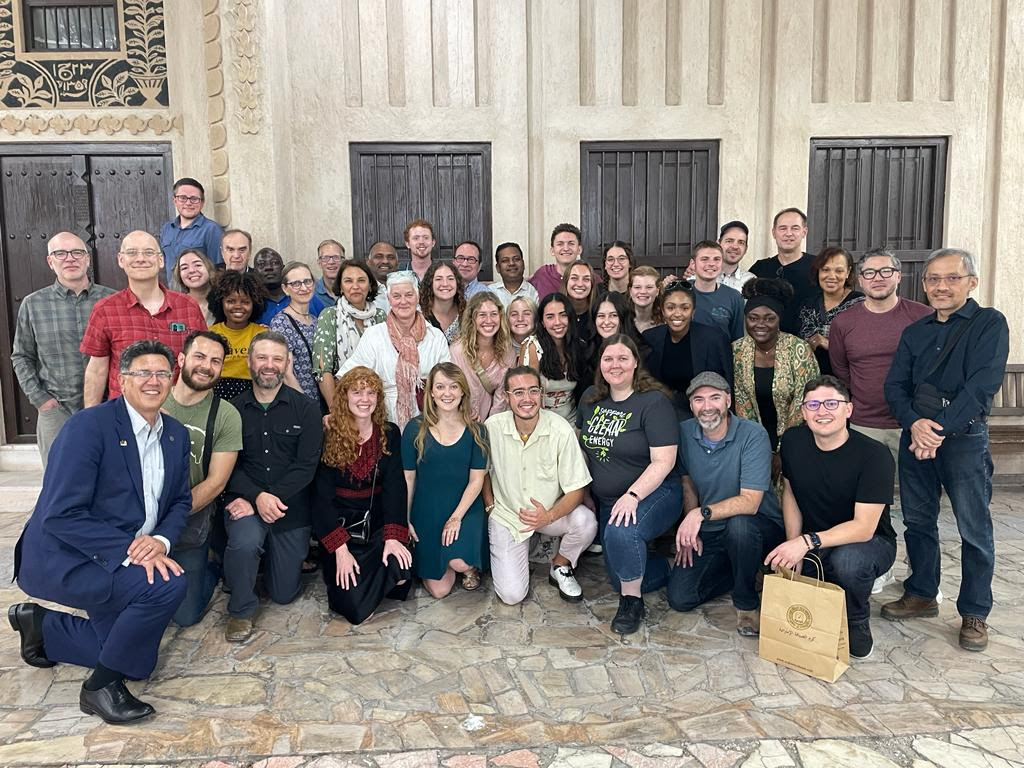
On the second day of COP28, the Loss and Damage Fund that was agreed to the previous year was operationalized. This fund has been fought for by Global South countries for more than a decade, and it seeks to address the effects of climate breakdown which cannot be mitigated or adapted to. Countries committed over $700 million to the fund, but this number pales in comparison to the estimated $400 billion a year that is needed for vulnerable countries to cover the costs of severe climate change impacts. Climate change affects all of us, but it’s the people who contributed the least to the problem that are facing the most severe impacts; stronger steps are needed to address the scope and the scale of the needs of households, communities and countries on the frontlines of the climate crisis.
Nature-based solutions to climate change were championed throughout the conference and in the final agreement. In the Faith Pavillion, A Rocha Ghana’s National Director, Seth Appiah-Kubi, described how A Rocha Ghana uses nature-based solutions like agroforestry and phytoremediation to restore landscapes that have been degraded by logging, mining, and overgrazing. By working together with local communities that surround forests and savannas, A Rocha Ghana has been able to mitigate climate change, restore biodiversity, and support livelihoods. You can watch the panel discussion here. Daryl Bosu, also from A Rocha Ghana, also championed nature-based solutions in a panel on climate financing for forests, biodiversity, and food security.
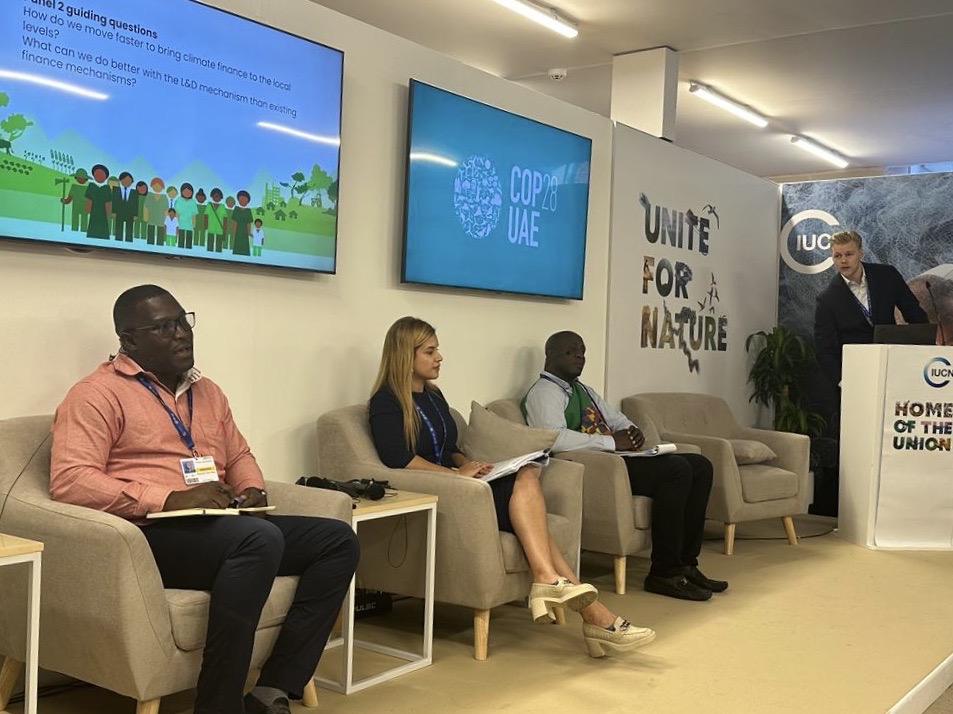
Addressing climate change and biodiversity loss go hand in hand, which is why we applaud the inclusion of a 2030 Deforestation goal in the UAE Consensus. The text “emphasizes the importance of conserving, protecting and restoring nature and ecosystems towards achieving the Paris Agreement temperature goal.” Approximately one-third of the emission cuts we need to keep warming under 1.5 degrees Celsius can come from Nature-based solutions such as restoring forests and peatlands. The text also emphasized the importance of Indigenous peoples’ knowledge and expertise. Unfortunately, the IPCC’s (Intergovernmental Panel on Climate Change) recommendation to protect 30 to 50 percent of all ecosystems was not included in the final consensus, indicating that we still have a way to go to address biodiversity loss and climate change in parallel.
2023 was the warmest year recorded in human history: one analysis from the Copernicus European Centre for Medium-Range Weather Forecasts put the average temperature at 1.48 Celsius above preindustrial levels. The only way to keep the Paris Agreement alive is a rapid phase-out of fossil fuels, which are causing more than three-quarters of this temperature increase. It is certainly a victory that the UAE Consensus calls on countries to “transition away from all fossil fuels in energy systems, in a just orderly, and equitable manner,” with the goal of reaching net-zero emissions by 2050. However, the text does not insist on the end to fossil fuel production and consumption that is desperately needed. In a year where oil and gas production in the United States hit an all-time high, we had hoped for an agreement with fewer loopholes and a clearer strategy than the stocktake offered.
In the aftermath of COP28, what’s most important is for everyone, everywhere to take climate action. Our friend, climate scientist Katharine Hayhoe offers this encouragement:
Our collective progress on climate action doesn’t depend on global summits. Our future doesn’t have to wait for what world leaders decide. Real change is happening now, in communities around the world, and every one of us has the power to contribute to this fight to protect the people, places, and things we love.”
As large, diverse, and vibrant communities around the world, Faith Based Organizations are essential for taking action on the climate crises. It was inspiring to see the addition of a Faith Pavilion this year to people together with a shared love for Creator and creation; it was an opportunity to celebrate our shared mission and learn from one another. If you want to take faithful Climate Action, consider reading Making a World of Difference, reducing and offsetting your emissions through Climate Stewards USA, and joining our Climate Action community at loveyourplace.org.

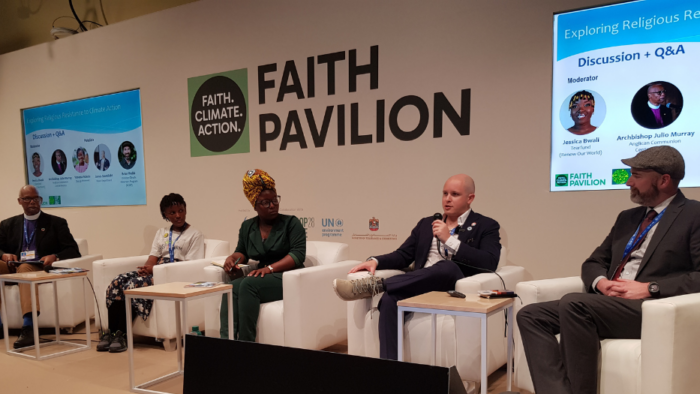
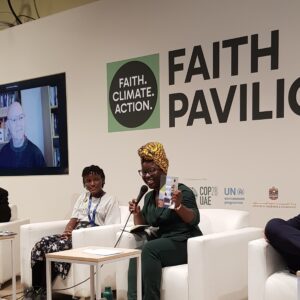
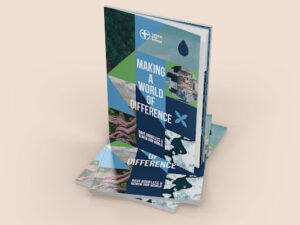







Add a Comment